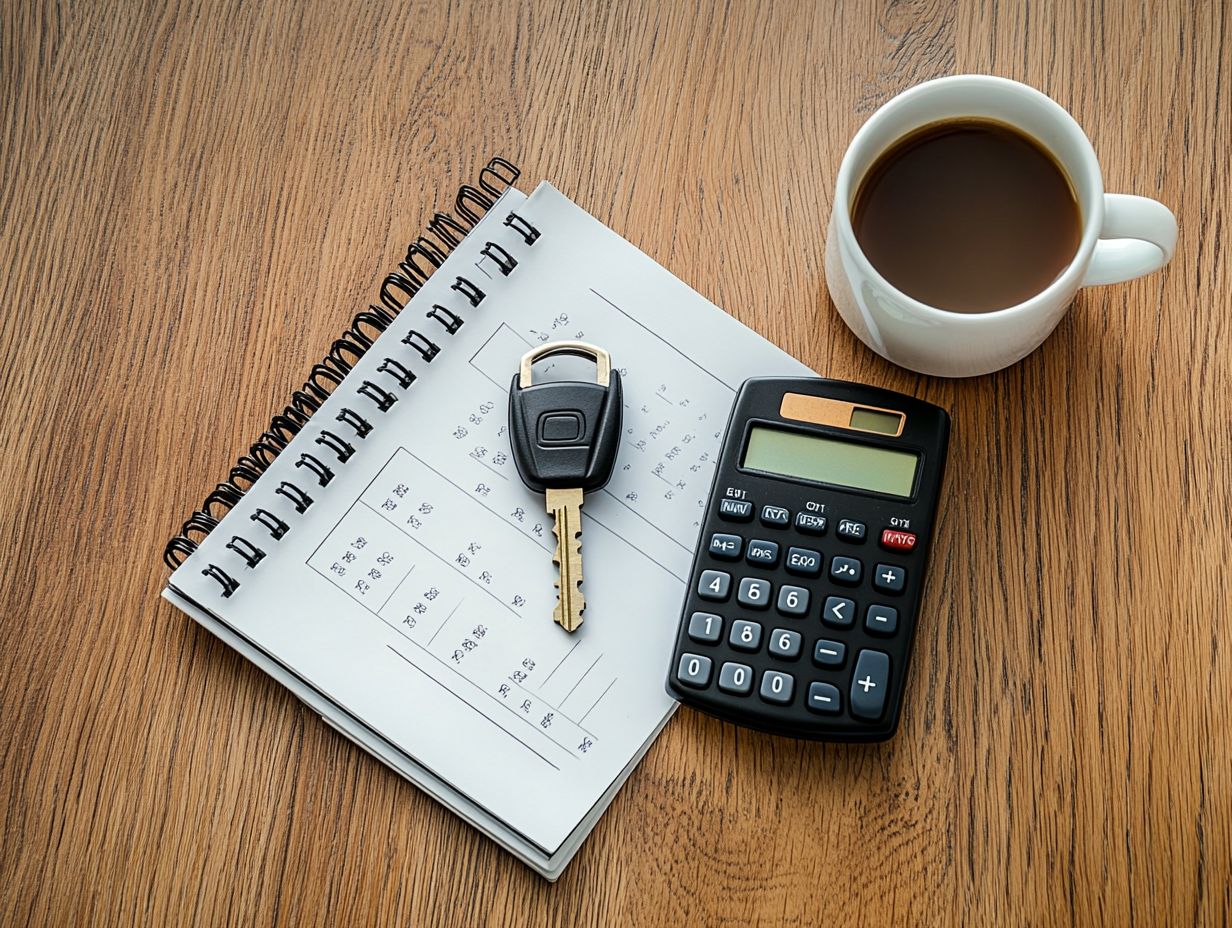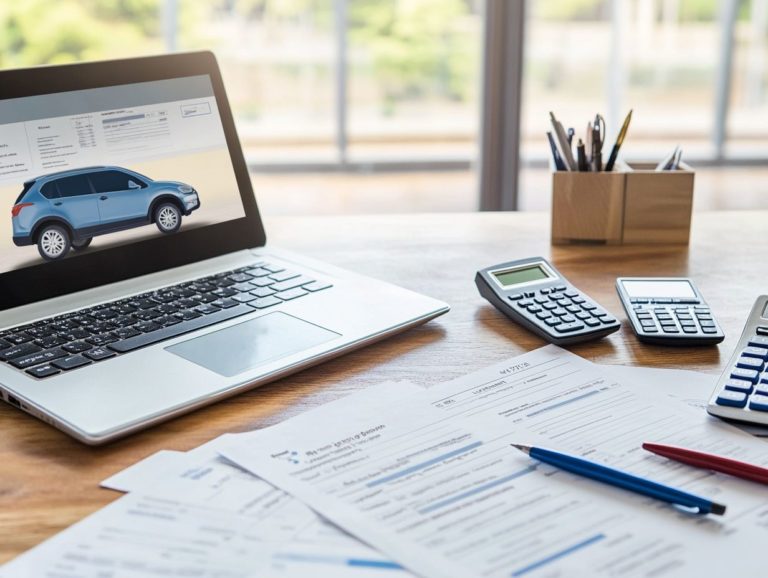How to Calculate Your Monthly Car Payment
Navigating the realm of car payments may seem daunting, but grasping the essential components empowers you to make informed decisions. Get ready to take charge of your car financing journey!
This article elucidates what a car payment entails, explores the factors that influence its monthly cost such as interest rates, loan terms, and vehicle price and provides effective methods for calculating it.
It also offers practical tips for reducing your payments, from negotiating with dealerships to enhancing your credit score.
Immerse yourself in this knowledge to seize control of your car financing journey!
Contents
Key Takeaways:

Know what a car payment is and how it affects your overall budget.
Interest rates, loan term, and vehicle price all play a role in determining your monthly car payments.
Use online calculators or manual calculation methods to determine your monthly car payment.
Negotiate with dealerships, improve your credit score, or consider buying a used car to lower your monthly car payments.
Understanding Car Payments
Grasping the details of car payments is crucial for you as a car buyer. This understanding enables you to make informed financial decisions that significantly influence your monthly budget and total expenditures.
Car payments involve a multitude of factors, such as the loan amount, interest rate, loan term, and down payment. All of these collectively shape what you will ultimately pay for your vehicle over time.
This comprehension gives you the power to navigate the world of car loans, whether you choose direct lending options or dealership financing, while also taking into account your credit score and essential steps involved in ensuring a seamless vehicle purchase.
What is a Car Payment?
A car payment is your monthly financial commitment to repay an auto loan, encompassing both the principal and interest throughout the loan’s duration.
Beyond these essential components, your payment may also incorporate various fees, including those tied to loan origination, as well as optional add-ons like extended warranties or service plans.
The total amount you pay each month is significantly shaped by factors such as current interest rates and the length of the loan term. Higher interest rates can markedly elevate your monthly payment, while opting for a longer loan term might lower it, albeit potentially resulting in greater overall interest payments.
Understanding how these elements work together helps you make informed and strategic financial decisions.
Factors Affecting Monthly Car Payments
Several critical factors play an important role in determining your monthly car payments, each one shaping the overall cost and affordability of your auto loan.
Among these factors are the interest rates established by financial institutions, the total loan term, the price of the vehicle, and the down payment you make at the time of purchase.
The trade-in value of your old vehicle significantly impacts the loan amount, which subsequently influences your monthly car payments.
Grasping these variables is essential for fine-tuning your auto loan strategies and maximizing interest savings over time.
Interest Rates
Interest rates are crucial when it comes to calculating the total cost of your auto loan. They directly affect both your monthly payments and the overall interest you’ll pay throughout the life of the loan.
Grasping how to secure favorable rates is essential for you as a borrower, since a variety of factors come into play. Your credit score, for instance, significantly impacts the interest rates offered to you; the higher your score, the better your offers tend to be.
Additionally, prevailing market rates set by financial institutions fluctuate based on economic conditions, which can influence the options available to you. The type of loan you choose whether it’s fixed or variable also plays a significant role in determining your APR (Annual Percentage Rate).
Negotiating the APR can lead to substantial savings, as even a small difference in interest rates can dramatically affect your total repayment amount over time. Thus, being informed and proactive can significantly help you in reducing your financial burden.
Don’t wait! Use this knowledge today to secure the best payment for your new car!
Loan Term

The loan term, or how long you pay back the loan, plays a significant role in shaping your monthly car payments and the overall cost of financing your vehicle.
As you consider an auto loan, you ll face a critical decision regarding the loan term length, which can vary from a few years to several.
Opting for a shorter loan term typically means higher monthly payments, but this choice often translates to lower total interest costs in the long run.
A longer loan term may ease your monthly payment burden, making it more manageable for your budget.
However, keep in mind that this option can lead to higher overall interest payments and increased risks of depreciation.
Understanding the trade-offs between short and long loan terms is vital for making a well-informed financial decision that aligns with your goals.
Vehicle Price
The vehicle price is a key factor that determines your loan amount and shapes the structure of your monthly payments for an auto loan.
As you evaluate the total cost, it’s essential to consider your trade-in value, which is the value of your old car if you decide to sell or trade it in, and any applicable sales tax. Together, these elements play a significant role in determining the overall loan amount.
Don’t underestimate the impact of sales tax; it can significantly influence your money decisions by adding to the total expenses of your vehicle purchase. It’s vital to thoroughly assess these components.
A well-informed understanding not only helps you secure a favorable loan but also empowers you to manage your long-term financial obligations with confidence.
Calculating Your Monthly Car Payment
Calculating your monthly car payment is a vital step in budgeting for an auto loan. Knowing how to use online calculators for car financing empowers you to make informed financial decisions about your vehicle purchase, ensuring that you align your investment with your overall financial strategy.
Using an Online Calculator
Using an online calculator is one of the simplest and most effective ways to estimate your monthly car payments based on your specific loan details, like how much you borrow and the interest rate.
These user-friendly tools make it quick and easy to see how your choices affect your payments. For example, by tweaking the interest rate or extending the loan term, you can easily visualize how these adjustments influence your overall monthly payments and total costs.
Leveraging these calculators not only simplifies your budgeting efforts but also empowers you to make informed decisions as you evaluate your financial commitments.
Manual Calculation Method
The manual calculation method enables you to compute your monthly car payments using a straightforward formula that considers the loan amount, interest rate, and loan term.
This approach gives you a clearer understanding of your financial commitments and empowers you to make well-informed decisions about your vehicle purchase.
By breaking down the total cost of the loan into manageable monthly payments, you can explore various scenarios. Adjusting each variable like increasing your down payment or negotiating a more favorable interest rate directly influences your final payment, potentially leading to significant savings over time.
Mastering this formula allows you to strategize your financing in a way that aligns perfectly with your budgetary needs.
Tips for Reducing Your Monthly Car Payment

Want to lower your car payments? There are several effective strategies to help you achieve this goal while ensuring your financial stability.
Follow these tips to lower your monthly payments and maximize your savings!
Negotiating with Dealerships
Negotiating with dealerships is an essential part of buying a car, as it can greatly impact the final price of the vehicle and the loan details you secure.
To master the art of negotiation, it s essential to develop effective strategies that will help you snag the best deal. Familiarizing yourself with the intricacies of sales tax, cash rebates, and current market values will give you the power to engage in discussions with confidence.
Conducting thorough research and knowing the average prices for similar vehicles will give you an edge during negotiations. Being clear about your financing preferences and exploring various options can lead to more attractive offers from dealerships.
By implementing these strategies, you ll not only increase your chances of getting favorable prices but also ensure that the loan details align perfectly with your financial goals.
Improving Your Credit Score
Improving your credit score is essential for qualifying for favorable loan rates, ensuring that your auto loan experience is as seamless as possible.
By grasping the importance of maintaining a strong credit history and consistently making timely payments, you can take proactive steps to enhance your score. This not only opens the door to better loan options but also leads to more attractive interest rates.
Regularly reviewing your credit reports helps you identify discrepancies or areas that need improvement. Using credit responsibly keeping your debt levels low and paying off balances promptly is crucial for building a healthier credit profile.
These efforts can lead to greater financial security and peace of mind.
Considering a Used Car
Considering a used car can be a savvy financial move for you, as it often comes with lower loan amounts and depreciation rates, leading to reduced monthly payments.
By opting for a pre-owned vehicle, you can take advantage of significantly lower purchase prices compared to new models, making it much easier to find a car that suits your budget.
Used cars experience less depreciation, which means they lose value more slowly over time. This stability is crucial for maximizing your investment.
The financing options for used vehicles often have better terms, allowing you to secure loans with lower interest rates. This can lead to substantial savings over time.
Choosing a used car can drastically boost your financial well-being now and in the future!
Frequently Asked Questions
How do I calculate my monthly car payment?

To calculate your monthly car payment, you will need to know the total cost of the car, the interest rate on your car loan, and the length of your car loan. You can then use a car loan calculator or do the calculation manually using the formula: monthly payment = (total loan amount * interest rate) / number of months in the loan term.
What factors affect my monthly car payment?
Several factors can affect your monthly car payment, including the total cost of the car, down payment amount, interest rate, and length of the loan term. Other factors that may influence your monthly payment include your credit score, trade-in value, and any additional fees or taxes.
Is it better to finance or lease a car?
It ultimately depends on your personal preferences and financial situation. Financing a car means you will own it at the end of the loan term, while leasing means you will return the car to the dealership. Leasing often has lower monthly payments, but financing allows you to build equity in the car.
Can I negotiate my monthly car payment?
Yes, you can negotiate your monthly car payment by negotiating the total cost of the car, interest rate, and length of the loan term. You can also lower your monthly payment by making a larger down payment or opting for a less expensive car.
What happens if I can’t afford my monthly car payment?
If you find yourself struggling to make your monthly car payment, you should reach out to your lender immediately. They may be able to offer solutions such as a loan extension or refinancing. Ignoring the issue can lead to repossession of the car and damage to your credit score.
How Can I Lower My Monthly Car Payment?
You can lower your monthly car payment in several ways. Start by making a larger down payment to reduce the amount you owe.
Negotiate the car’s price to get a better deal. You can also choose a longer loan term, which spreads the payments out over time.
Consider refinancing your car loan to get a lower interest rate. This means you get a new loan to replace your current one, often with better terms.
Lastly, think about trading in your car for a less expensive model. Each of these steps can help you save money each month!






